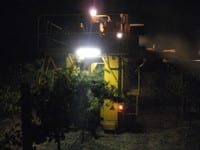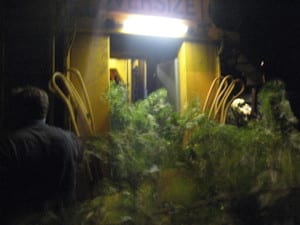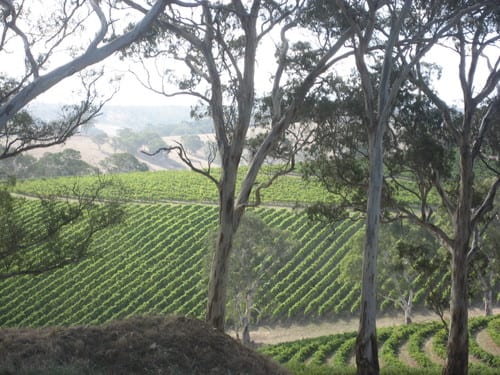Meltdown is upon us. As I stated earlier, this is turning out to be one of the most extraordinary years in Aussie viticultural history, and the vineyards are finally kaputt, calling it a day, and falling apart. The R winemaking team has been walking through all of the vineyards, over 150 of them, monitoring the ripeness of the fruit closely. Very rarely during these tours has a grower been tagging along-that is, until now. 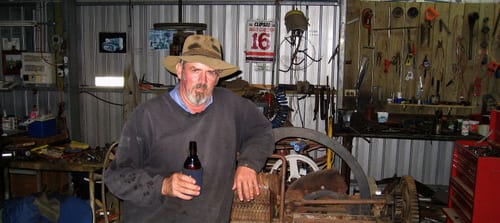 The growers, a salty group of characters, are deeply concerned about their vineyards, which are on the brink of disaster, and they are making themselves known now. Trevor K., R Wine’s McLaren viticulturist, fears for his life currently, since he’s the liason between the growers and winemakers, and schedules the harvest times. Getting rough-hewn farmers, like Joe Blakely pictured here, to understand the product the winemakers are trying to create is no mean feat, and it’s Trevor K., unfortunately, who finds himself stuck in the middle between the two groups. Fortunately, he is a good sprinter with the defensive reflexes of an echidna.
The growers, a salty group of characters, are deeply concerned about their vineyards, which are on the brink of disaster, and they are making themselves known now. Trevor K., R Wine’s McLaren viticulturist, fears for his life currently, since he’s the liason between the growers and winemakers, and schedules the harvest times. Getting rough-hewn farmers, like Joe Blakely pictured here, to understand the product the winemakers are trying to create is no mean feat, and it’s Trevor K., unfortunately, who finds himself stuck in the middle between the two groups. Fortunately, he is a good sprinter with the defensive reflexes of an echidna.

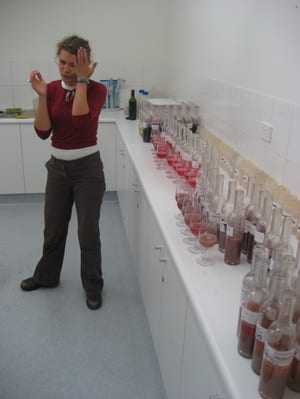
The fact that the big 4- Fosters, Mildara Blass, Hardy’s, and Orlando Wyndham have been screwing over growers like Joe for years now by paying crap prices hasn’t helped their self-esteem. So it’s no wonder they can’t understand why the fruit is still hanging in their vineyards, since most vines have yellowed and are literally falling apart. Joe’s paid by the tonnage he can deliver, which is already down by half this year. The grapes are going past the “golf ball” or bagging stage, when the grapes begin to dimple and flavors intensify, and in some cases are looking likes raisins. Meanwhile, as Joe’s grapes lose even more water weight and dollars by the day, he can be heard mumbling outloud, “why the hell I left cattle farming 15 years ago to plant grapes is still a mystery to me”. His shiraz was harvested the night we were there. He maintained a wonderful stoic calmness, however, as life has thrown Joe and his wife a few curveballs before.
The winemakers, in contrast to the growers, like the fruit to hang late in a year like this with such uneven ripening, trying to maximize the intensity of flavor, and it is they who make the call when to harvest. After all, they are the ones who have to live the next year with the juice that follows. And they pay for the grapes.
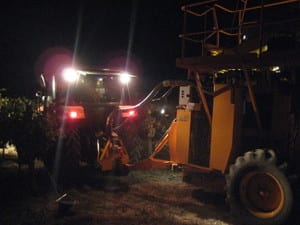
In many places in the Vale, more importantly, the harvest has begun. I went out late last night, which is when the reds are picked when it’s cool, and rode on top of a few different mechanical harvesters with the Vale’s top viticulturist and Trevor K.’s boss, Peter Bolte.
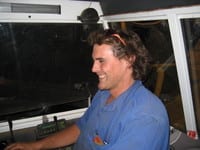
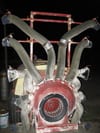
This is Peter’s 31st harvest and he seemed a little dejected, as well, even finding it hard to be optimistic about next years harvest, since a frost earlier this year damaged the vines. We visited my “friend” and starling shooting grower, Yanni Pappas, who sat looking defeated in his workshop, drinking scotch with his wife, as he saw the paucity of fruit coming off his bedraggled vines.
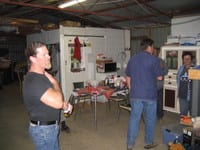
Peter and Trevor K. hung out with their clients (the growers) late into the night as the results came in, standing by them during this historically fruitless harvest, trading stories and lending a sympathetic ear. Perhaps it was a bit like being at the campaign headquarters of Bob Dole after he knew he was about to be tractor rape chained by Bill Clinton in 1996. There was a real sense of community here last night, and it demonstrates why Bolte is one of the most respected viticulturists in Australia. The man lives and breathes his work, much like the growers and winemakers he works for. 
How this vintage turns out is anybody’s guess. There is awesome fruit coming later than normal from Riverland, 3 hours NE of Adelaide. The Barossa is coming down the pipe soon, and I’ll be up there more next week. But what comes from the McLaren Vale vineyards, over 60 of them coming in simultaneously 4 weeks early, remains to be seen. Will the ripening even out? Will there be balance? Hopefully, the fruit will be distinctive and delicious. At the very least, it would be some consolation to help compensate for what could be called the worst year ever for the South Australian grape growers.

